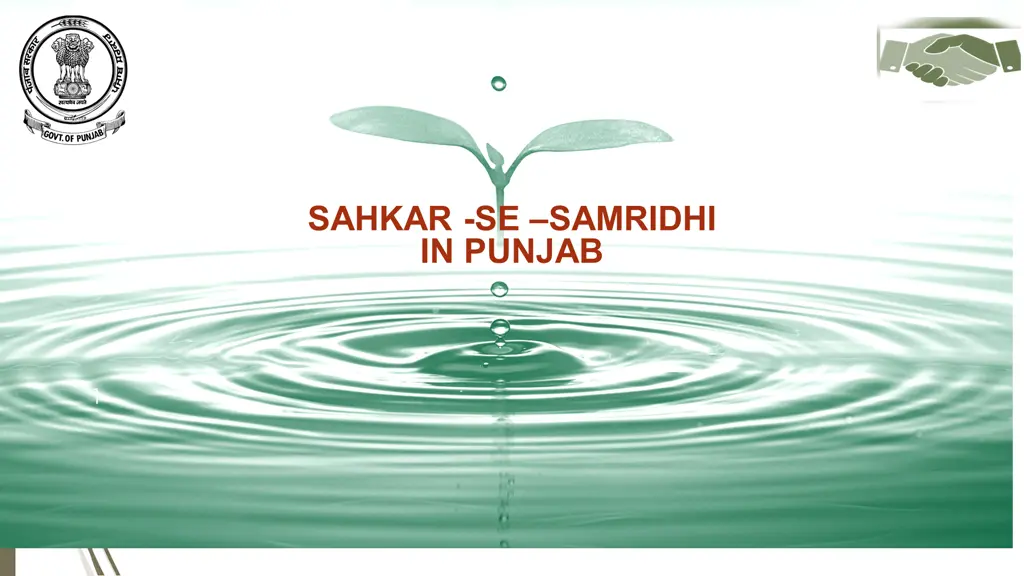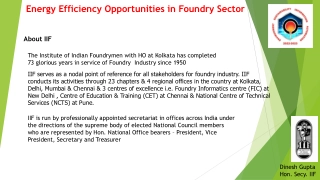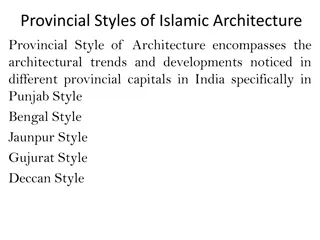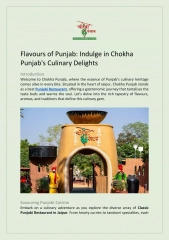Sahkar Se Samridhi in Punjab
Sahkar Se Samridhi (Cooperatives Pillar of Rural Economy) has played a significant role in strengthening the rural economy in Punjab. Learn about the contributions of PACS, Markfed, PSCB, PSCADB, Milkfed, and Sugarfed in empowering farmers and fulfilling their dreams.
Download Presentation

Please find below an Image/Link to download the presentation.
The content on the website is provided AS IS for your information and personal use only. It may not be sold, licensed, or shared on other websites without obtaining consent from the author. Download presentation by click this link. If you encounter any issues during the download, it is possible that the publisher has removed the file from their server.
E N D
Presentation Transcript
SAHKAR -SE SAMRIDHI IN PUNJAB 1
COOPERATIVES-PILLAR OF RURAL ECONOMY Sehkar-Se-Samridhi has remained the theme of Punjab Rural Economy. PACS, Markfed, PSCB, PSCADB, Milkfed and Sugarfed have made significant contribution over the last few decades to strengthen the rural economy and help farmers to fulfill their dreams. Presence of wide network of approx. 3500 PACS and Apex Cooperative Institutions that cover every village in the State. Cooperatives are instrumental in revitalizing Punjab s agrarian economy in various ways: They improve economic conditions of farmers, provide timely and cost effective credit and other farm inputs like fertilizers, pesticides. Numerous PACS have Agro Service Centres equipped with large pool of equipments to help farmers at affordable rates. Cooperative Institutions are critical for price stabilization and assured procurement. 2
WELFARE OF FARMERS PSCB and DCCBs are committed to farmers welfare and work with meager margin of 0.25%. Over the years, this has helped to reduce dependency on moneylenders. KCC was started in PSCB in 1978 and was later on adopted by NABARD. PSCB and its DCCBs have advanced more than Rs. 10155 crores of short-term agricultural credit to almost nine lakh farmers. RCC was started in Punjab in 1997 and was later on adopted by other progressive States. RCC limits to meet the household/consumption and other needs of farmers. Around Rs. 1100 crores has been advanced as RCC. Milkfed shares about 80% of its revenue with dairy farmers associated with its Milk Unions. Milkfed helps to stabilize procurement and price of milk in the State and assures offtake of milk during flush season. Markfed procures 25% of wheat and paddy from farmers for central pool stocks from Punjab. 3
FOOD PROCESSING Markfed exports 90% of its products. It was adjudged as the largest Marketing Co-operative in Asia during 2013-2014. Markfed turnover during the financial year 2021-2022 was Rs. 23000 crore with multiple products and activities. Markfed products are sold under SOHNA brand and encompass edible oils, tea, spices, pulses, flour, pickles, juices, jams, etc. Markfed also supplied 4,14,497 MT of fertilizers and 46559 MT cattle feed to the farmers. Milkfed sells milk and milk products including dahi, cheese, lassi, ice cream, desi ghee, butter, sweets, etc. under the Verka brand Thus Cooperatives have brought products, services and resources at the doorstep of villagers in Punjab. 4
CROP DIVERSIFICATION & SUPPLEMENTING FARM INCOMES Crop diversification has emerged as a necessity for sustainability of natural resources, employment generation and to attain higher productivity levels. Markfed promotes contract farming by giving financial benefits to farmers. Nine Cooperative Sugar Mills under Sugarfed Punjab have 28,564 sugar cane farmers attached with them. Sugarfed crushes around 30% of total cane crushed by all Sugar Mills in the State of Punjab with a crushing capacity of 17750 TCD per day. Milkfed procures an average of 19.17 LLPD Milk from approximately 2.91 lakh Dairy Farmers through 6059 Milk Producers Cooperative Societies (MPCS). Intercropping of oilseeds, pulses and vegetables (garlic, pea, potato, cabbage, etc.) alongwith sugarcane is being popularized to enhance the income of sugarcane farmers and provide cash flow in mid season 5
TECHNOLOGICAL UPGRADATION & QUALITY ASSURANCE Milkfed has installed 4474 Automatic Milk Collection Unit (AMCUs) and 1263 Bulk Milk Coolers (BMC) at various Milk Producers Cooperative Societies (MPCS) and in the next 6 months 615 more AMCUs and 150 more BMCs will be installed. 657 Milk-o-screens are installed for on the spot differentiation between adulterated & pure milk and another 223 more Milk-o-screens at MPCS will be installed within next 6 months. By-Pass Protein plant of 50 MT per day capacity has been established by Milkfed at its cattle feed plant for providing cheaper source of Protein, essential amino acids for improving reproductive efficiency of milch animals. Markfed has set up two cattlefeed manufacturing Units on PLC (Programmable Logic Control) basis, free from any human touch. Sugarcane Research & Development Institute has been set up for promoting research & development activities to increase per acre yield of the crop and to enhance income of farmers. New project for production of Compressed Bio Gas from Paddy Straw is being set up by Indian Oil Corporation at Patiala, which will create additional employment opportunities and curb stubble burning. 6
WASTE- TO -ENERGY PROJECTS. A Cogeneration Project has been set up at Bhogpur Cooperative Sugar Mills in 2020-21. Bhogpur Sugar Mill crushed 31.47 lakh qtls. of sugarcane in 2021-22 and exported power amounting to Rs.14 crores to the State Power Utility ( PSPCL). The Bhogpur Cogeneration Project operates with Rice Straw during off-season in PPP Mode. The project has been started on 09-06-2022. New distillery for production of Ethanol is being set up at Gurdaspur Cooperative Sugar mill. Two projects for production of Bio-CNG from press mud, agricultural waste etc. are being set up in PPP mode on BOT basis. 7
SOCIAL INTEGRATION THROUGH COOPERATIVES Cooperatives in Punjab help in social integration through ensuring democratic control of societies, and concern for community. 184 registered Self Help Groups provide financial independence to women. The Department has initiated Mai Bhago Istri Sashaktikarn Scheme for skill development of rural women. 2165 Labour and Construction Societies provide employment to rural labour. Rs 94 crores has been advanced under JLG framework by PSCB. 8
COOPERATION AMONG COOPERATIVES Milkfed, Markfed and Sugarfed have collaborated for sale of their products through 180 booths that are jointly run by them. PACS are serving as sale point for products like Markfed and Milkfed s cattlefeed, Sugarfed sugar, etc. Financial aid is given by PSCB on need basis to Cooperative Institutions for capacity expansion, new projects and modernization. All Cooperative Institutions contribute a part of their profit to the Cooperative Development Fund (CDF) and contribute jointly to the training institute run by Punjab Institute of Cooperative Training (PICT). 9
INITIATIVES All requirements for PACS Computerization like Audit of Primary Agricultural Cooperative Societies, formation of SLIMC and DLIMC and budgetary provisions from State Government are complete. 3400 Whatsapp groups of PACS have been formed for transparency and quick dissemination of information. 1200 loss making PACS have been adopted by officers of the Department and the Bank for personalized attention. Paperless Online registration of all Cooperative Societies will begin on 15thSeptember 2022. Cooperative Machinery Tracker Application has been created to track usage of agricultural implements on custom-hiring basis. 10
WAY FORWARD Increase in Business of PACS through diversification of activities like LPG Agencies, Super stores, PACS as E-commerce delivery agents. Promotion of income generating Activities in Agriculture/Food processing sector including marketing . Modernization of Cooperatives Sugar Mills to boost crop diversification and to promote use of innovative technology. Post Harvest Crop Management Infrastructure to be enhanced through Agriculture Infrastructure Fund (AIF) Scheme to check stubble burning. Automation and Quality assurance to improve raw milk and product quality. Provision of A-class storage facilities for fertilizers Reduction in Non-Performing Assets through recovery and financial assistance to the Cooperative Banks. Optimal leveraging of financial resources by moving to 2 tier system in PSCB. 11
Thanks 12













